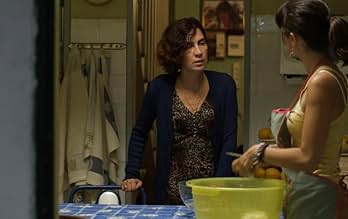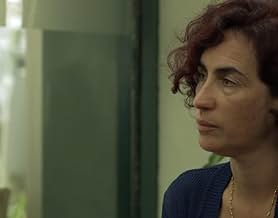AVALIAÇÃO DA IMDb
7,3/10
2,1 mil
SUA AVALIAÇÃO
Adicionar um enredo no seu idiomaA regular family living in the outskirts of Lisbon sees the serenity of their lives shaken beyond any remedy within a week.A regular family living in the outskirts of Lisbon sees the serenity of their lives shaken beyond any remedy within a week.A regular family living in the outskirts of Lisbon sees the serenity of their lives shaken beyond any remedy within a week.
- Prêmios
- 21 vitórias e 9 indicações no total
Maria João Vaz
- Algarvio
- (as João Vaz)
Avaliações em destaque
This movie made a strong impact by exposing the scars of a society living on the margins. It humanizes and dignifies the suffering of the working class, refusing any glamourization or easy redemption. Canijo presents characters who live on the edge, doing so with fierce empathy, leaving the audience with the feeling of having lived, if only for a few hours, within that dark and intense universe. This film is, ultimately, a reflection on family love and the cost of survival in adverse conditions, where every choice is a double-edged sword. It is a work that leaves its mark, highlighting João Canijo's power to explore the human condition in its most complex and often uncomfortable dimensions.
This sprawling drama about a Portuguese family combines melodrama and social realism so inventively that it practically occupies a genre of its own. Writer-director Joao Canijo grounds the movie in vivid observations of the Lisbon public housing complex where much of the action occurs, and his characterizations—developed, Mike Leigh-style, in close collaboration with the cast--have a similarly gritty authenticity. Yet the movie is also richly stylized, with old- fashioned tracking shots and compositions that allow for two conversations at once, and some narrative developments have the force of Greek tragedy. What emerges is an operatic portrayal of the working poor in which each character's struggle seems monumental. Rita Blanco and Rafael Morais are on top of their game with such deep and complex acting that makes us shiver. One of the best movies I've seen, ever! And definitely the best of 2011.
Portuguese director Joao Canijo returns with his eighth feature, Blood of My Blood, (his first fictional outing since 2007's Misbegotten) a sprawling, all consuming portrait of one week in the life a matriarchal run familial unit in the slums outside Lisbon, and may indeed be his masterpiece. Inevitably, there's no denying a comparison of technique with Altman and Mike Leigh (Canijo spent two years developing the characters with the actors via a series of workshops as Leigh does), but the film stands quite firmly as an often uncomfortable, unpleasant, and always fascinating family saga that would, in a fair world, finally open up the English speaking market to Canijo's previous directorial efforts, which date back to the early 80s.
In Padre Cruz, a slum on the edge of Lisbon, the Fialho clan, whose workable, but makeshift daily existence is about to be severely shaken. The family matriarch, Marcia (Rita Blanco) has singlehandedly raised her two children, Joca (Rafael Morais) and Claudia (Cleia Almeida), and she works in a restaurant where she has a distant but apparently fulfilling relationship with Helder (Fernando Luis). Marcia's younger sister, Ivete (Anabela Moreira), a hairdresser, also lives with them, her goal to get breast implants in an effort to retain her waning sex appeal, as time seems to be taking its toll on her. Besides daily squabbles and bickering between the usual amiable relatives, which includes Joca's girlfriend, Erica (Wilma de Brito) and Claudia's boyfriend, Cesar (Francisco Tavares) who works a security guard at the same grocery story with Claudia, it's Marcia's children that create a situation that not even the fierce convictions of their flinty mother can put right.
We first meet Joca as he explains to Telmo (Nuno Lopes), the dealer he works for, that he has just been robbed by the buyer he had been sent to meet. Telmo doesn't take this news too easily, and we learn that wild child Joca has been in prison already for drug trafficking. But Telmo's not so sure that Joca's being up front with his missing drugs. Meanwhile, Claudia, currently going to nursing school and planning a wedding with the jealous and needy Cesar, tells her mother she's in love with a married man. Marcia discovers the man, Alberto (Marcello Urgeghe) is one of Claudia's teachers, and travels to Alberto's fancy, upscale neighborhood to confront him about his relationship with Claudia. Throughout several interactions between Alberto and Claudio, we learn varying bits of information that complicate the situation, though something drastic has to take place before either Alberto or Claudia decide to listen to Marcia.
Canijo employs a novel split screen technique in his opening frames, which he repeats several times throughout the feature, using the camera to dissect rooms, using only a wall as separation. On one side, Joca and Telmo heatedly bickering about drug money, with Telmo's two young daughters delicately listening at the breakfast table on the other side, and so on. Canijo often catches characters in the same room or an adjacent space, their conversations overlapping at the same time. But as the film progresses, these busied frames give way to solemn close-ups, grotesquely calming the background to focus on the important and prophetic details we need to clue in on, not unlike tightening the coil of a noose. Even a karaoke bar (presented by Lord Jim Karaoke, a possible nod to Conrad's classic novel concerning the abandonment of a ship in distress) gives us competing, overlapping songs, with Cesar singing a Joe Cocker duet and Ivete crooning "Just Too Good To Be True," to Telmo, a tune which will haunt us again later. We soon leave behind the eerie green nighttime glow in Marcia's apartment, where the camera roves around the property like a hungry insect, until we end up in one sweaty, dark apartment where we observe one of the most upsettingly degrading scenarios (employing, once again, the Four Seasons) you're apt to see this year for the (almost) final outcome of the foolhardy actions of Joca and Claudia.
The two year character preparation obviously paid off for Canijo and his cast. There's definitely a fluidity between the Fialho's, even as they wander through the more sensationally salacious aspects of the narrative. A longer version, clocking in at over three hours, exists, and the material has also been prepared to air in a three part episode version for television, perhaps a more accessible venue due to its lengthy, but utterly worthwhile, running time. After its final frames, you can't help but ruminate on the monstrously perverted notions of the lengths people are willing to go (as well as what they're not willing to do) for those that are considered, in this perfectly titled film, Blood of My Blood.
In Padre Cruz, a slum on the edge of Lisbon, the Fialho clan, whose workable, but makeshift daily existence is about to be severely shaken. The family matriarch, Marcia (Rita Blanco) has singlehandedly raised her two children, Joca (Rafael Morais) and Claudia (Cleia Almeida), and she works in a restaurant where she has a distant but apparently fulfilling relationship with Helder (Fernando Luis). Marcia's younger sister, Ivete (Anabela Moreira), a hairdresser, also lives with them, her goal to get breast implants in an effort to retain her waning sex appeal, as time seems to be taking its toll on her. Besides daily squabbles and bickering between the usual amiable relatives, which includes Joca's girlfriend, Erica (Wilma de Brito) and Claudia's boyfriend, Cesar (Francisco Tavares) who works a security guard at the same grocery story with Claudia, it's Marcia's children that create a situation that not even the fierce convictions of their flinty mother can put right.
We first meet Joca as he explains to Telmo (Nuno Lopes), the dealer he works for, that he has just been robbed by the buyer he had been sent to meet. Telmo doesn't take this news too easily, and we learn that wild child Joca has been in prison already for drug trafficking. But Telmo's not so sure that Joca's being up front with his missing drugs. Meanwhile, Claudia, currently going to nursing school and planning a wedding with the jealous and needy Cesar, tells her mother she's in love with a married man. Marcia discovers the man, Alberto (Marcello Urgeghe) is one of Claudia's teachers, and travels to Alberto's fancy, upscale neighborhood to confront him about his relationship with Claudia. Throughout several interactions between Alberto and Claudio, we learn varying bits of information that complicate the situation, though something drastic has to take place before either Alberto or Claudia decide to listen to Marcia.
Canijo employs a novel split screen technique in his opening frames, which he repeats several times throughout the feature, using the camera to dissect rooms, using only a wall as separation. On one side, Joca and Telmo heatedly bickering about drug money, with Telmo's two young daughters delicately listening at the breakfast table on the other side, and so on. Canijo often catches characters in the same room or an adjacent space, their conversations overlapping at the same time. But as the film progresses, these busied frames give way to solemn close-ups, grotesquely calming the background to focus on the important and prophetic details we need to clue in on, not unlike tightening the coil of a noose. Even a karaoke bar (presented by Lord Jim Karaoke, a possible nod to Conrad's classic novel concerning the abandonment of a ship in distress) gives us competing, overlapping songs, with Cesar singing a Joe Cocker duet and Ivete crooning "Just Too Good To Be True," to Telmo, a tune which will haunt us again later. We soon leave behind the eerie green nighttime glow in Marcia's apartment, where the camera roves around the property like a hungry insect, until we end up in one sweaty, dark apartment where we observe one of the most upsettingly degrading scenarios (employing, once again, the Four Seasons) you're apt to see this year for the (almost) final outcome of the foolhardy actions of Joca and Claudia.
The two year character preparation obviously paid off for Canijo and his cast. There's definitely a fluidity between the Fialho's, even as they wander through the more sensationally salacious aspects of the narrative. A longer version, clocking in at over three hours, exists, and the material has also been prepared to air in a three part episode version for television, perhaps a more accessible venue due to its lengthy, but utterly worthwhile, running time. After its final frames, you can't help but ruminate on the monstrously perverted notions of the lengths people are willing to go (as well as what they're not willing to do) for those that are considered, in this perfectly titled film, Blood of My Blood.
I hope the members of the Academy see Blood of My Blood and nominate the film for Best Foreign Language Film. It is a Cassavetes/Scorsese/Tarantino kind of thriller, that will dry your goats. It's a thriller made of human dramas, rather than suspense or action, with great acting and a modern way of filming. Director Joao Canijo made use of surround sound and camera angles in order to have a complete view of two sequences/discussions at the same time, making ich view more defying.
Besides, Portugal never got a nomination from the Academy, and in the current crisis, no film is being produced or will be if we don't get this recognition. Nominating it will be a statement for Portugal to continue to have an industry.
Besides, Portugal never got a nomination from the Academy, and in the current crisis, no film is being produced or will be if we don't get this recognition. Nominating it will be a statement for Portugal to continue to have an industry.
10vitor_04
This is a movie that i'll never forget. Rita Blanco is in the best (and when i say the best i mean the best) performance i've ever seen in cinema. Yes, i know - i'm Portuguese, it's predictable i would say this is a great movie. But the truth is that Joao Canijo sees the cinema exactly how i see it, going deep on characters and going deep on their misery, always with a peace of comedy and truth in it. it's not a complicated history, the sexual content in it it's not unnecessary and the music background was not written by big contemporany compositors. The only concern of Joao was to make a movie faithful to the inconditional love story behind a poor family with huge problems appearing.
Você sabia?
- CuriosidadesPortugal's official submission to the Best Foreign Language Film category of the 85th Academy Awards 2013.
Principais escolhas
Faça login para avaliar e ver a lista de recomendações personalizadas
- How long is Blood of My Blood?Fornecido pela Alexa
Detalhes
- Tempo de duração2 horas 11 minutos
- Cor
- Mixagem de som
- Proporção
- 1.85 : 1
Contribua para esta página
Sugerir uma alteração ou adicionar conteúdo ausente

Principal brecha
By what name was Sangue do Meu Sangue (2011) officially released in Canada in English?
Responda






























